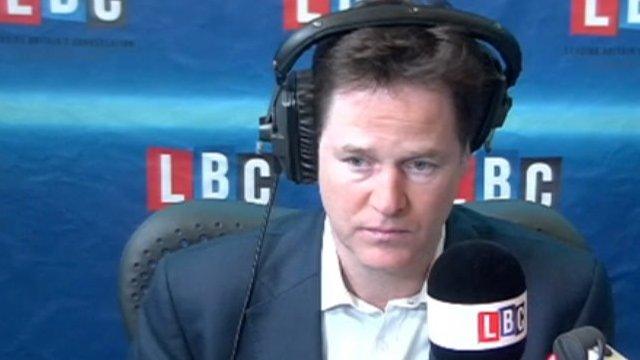Farage: EU does have 'blood on its hands' over Ukraine
- Published
The issue of immigration sparked a fiery exchange between Mr Clegg and Mr Farage - Courtesy LBC/Global TV
Nigel Farage has stood by his claim that the EU has "blood on its hands" for "destabilising" Ukraine.
The UKIP leader rejected claims by Nick Clegg that he was "siding" with Russian President Vladimir Putin.
But he stepped up his attack on EU foreign policy, saying it had been "disastrous".
Lib Dem leader Mr Clegg said he was "shocked" by Mr Farage's comments on Ukraine in the first of their two debates on Britain's place in Europe.
Speaking on his weekly LBC radio phone-in the day after the debate, Mr Clegg said he was "extraordinarily surprised and shocked to find he (Mr Farage) agrees with Vladimir Putin".
He said it was "insulting" to people in Kiev who were "simply standing up for values that we should share and support, of democracy, of autonomy".
"It shows quite how extreme people can be, like Nigel Farage, when their loathing of the European Union becomes so all-consuming that they even end up siding with Vladimir Putin," he added.
'Imperialist'
The two party leaders locked horns for an hour on whether Britain should remain in the EU - trading verbal blows on immigration, jobs and trade among other issues.
Mr Clegg and Mr Farage each had one minute to set out their position as the debate began - Courtesy LBC/Global TV
Most pundits said Mr Farage had won the debate after a YouGov poll for the Sun put him on 57% to Mr Clegg's 36%.
Asked by an audience member why Ukraine wanted to join what he had called a "failed" institution, Mr Farage attacked the EU's "imperialist, expansionist" ambitions, saying it had "blood on its hands" for encouraging Ukrainians to topple their president.
Expanding on the theme in a written statement after Mr Clegg's criticisms, he said: "We are seeing vanity take the place of reason in foreign policy and the result is to destabilise a whole series of countries to no positive effect that I can discern. It is not just the Ukraine.
"The civil war in Syria was made worse by EU leaders stoking the expectation of western forces helping to topple the Assad dictatorship despite the increasing dominance of militant Islamists in the rebellion."
'Ungovernable'
He added: "I do not support what Putin has done - of course I don't.
"But the approach of David Cameron, William Hague, Nick Clegg and other EU leaders has been disastrous.
"If you poke the Russian bear with a stick he will respond. And if you have neither the means nor the political will to face him down that is very obviously not a good idea."
He also attacked David Cameron over his intervention in Libya, claiming the country had been left "ungovernable, unstable, divided and very, very dangerous".
He said the British public were sick of being "dragged into conflicts where no pressing national interest was at stake".
He said European leaders should not allow the expectation to grow that countries such as Britain "will always side with uprisings in the naive belief that benevolent liberal democracy is bound to replace existing regimes, fundamentally imperfect as they are".
"That is not the way the world works. So I repeat the charge: the EU has blood on its hands," he added.
Speaking on BBC One's Question Time, Conservative International Development Secretary Justine Greening said her party was the only one of the main Westminster parties to offer a referendum on staying within the EU.
Mr Cameron has promised the public a vote by the end of 2017 if he wins an outright majority at next year's general election.
Ms Greening said: "We have to allow people in our country, for the first time in decades, a choice on this."
Meanwhile, in a joint article in the Financial Times, Chancellor George Osborne and his German counterpart Wolfgang Schauble say that any future EU treaty change must "guarantee fairness" to countries, including the UK, that stay outside the eurozone.
Mr Farage and Mr Clegg are due to take part in a second debate - when the subject of the EU's foreign policy is likely to be near the top of the agenda - on 2 April on BBC Two.
- Published27 March 2014
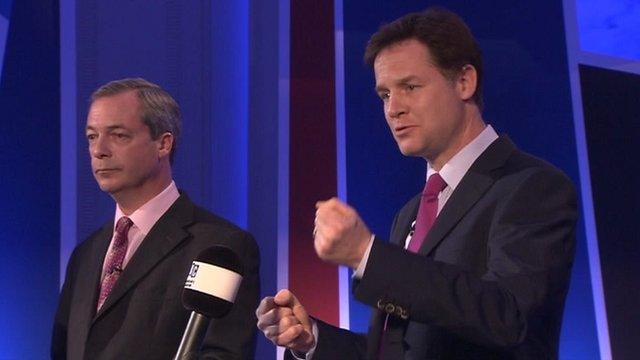
- Published26 March 2014
- Published26 March 2014
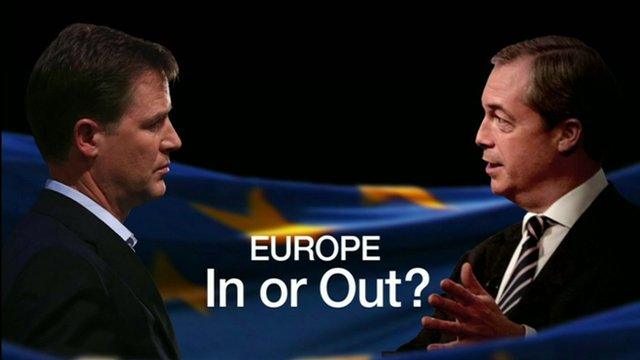
- Published26 March 2014
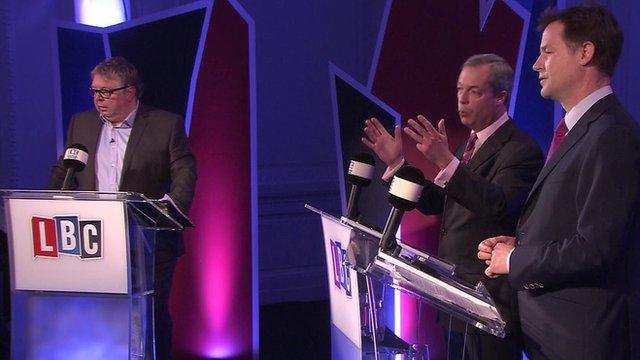
- Published26 March 2014
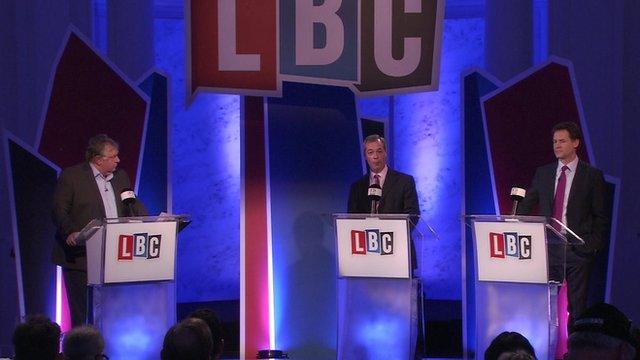
- Published26 March 2014
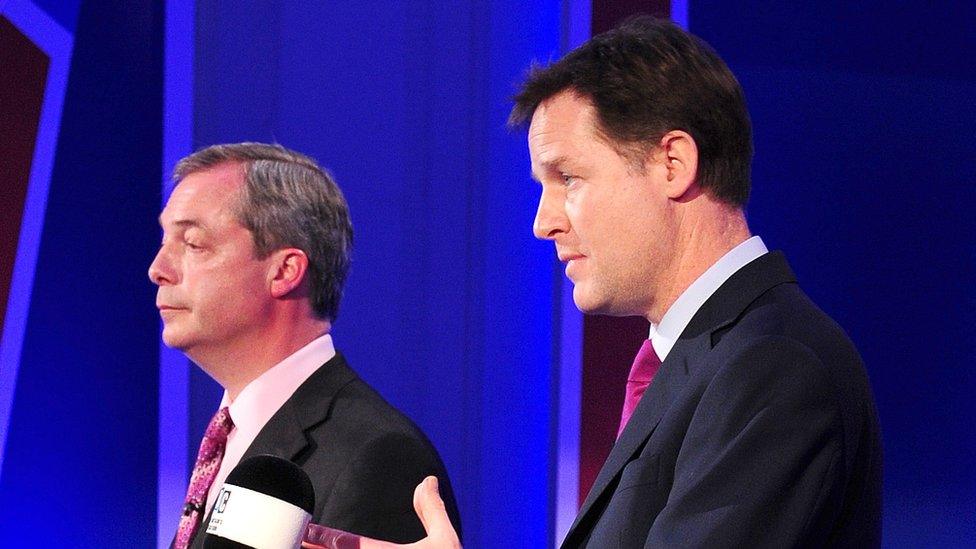
- Published26 March 2014
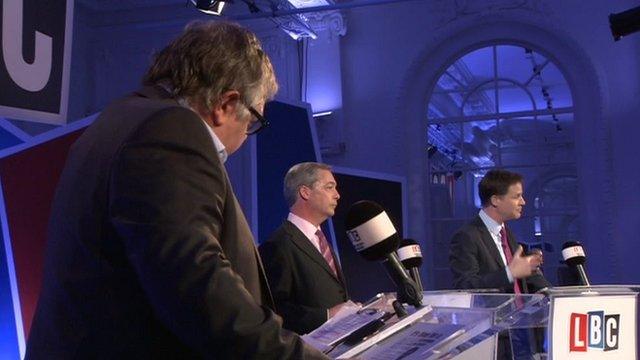
- Published26 March 2014
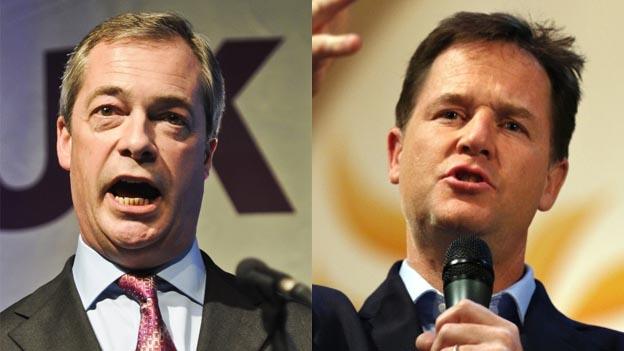
- Published5 March 2014
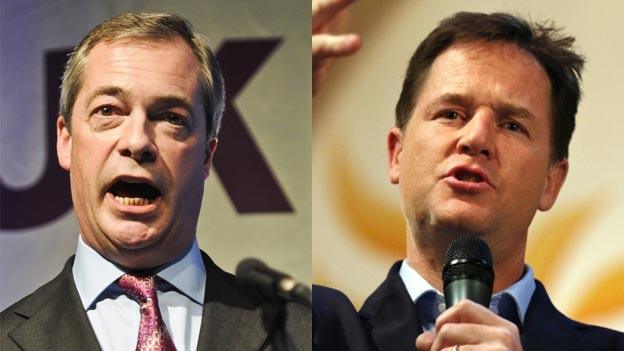
- Published23 February 2014
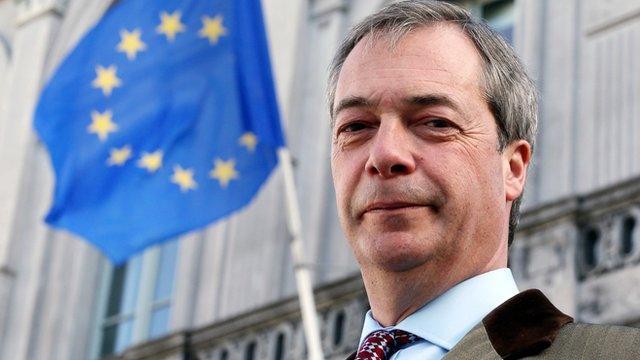
- Published20 February 2014
